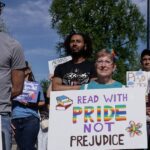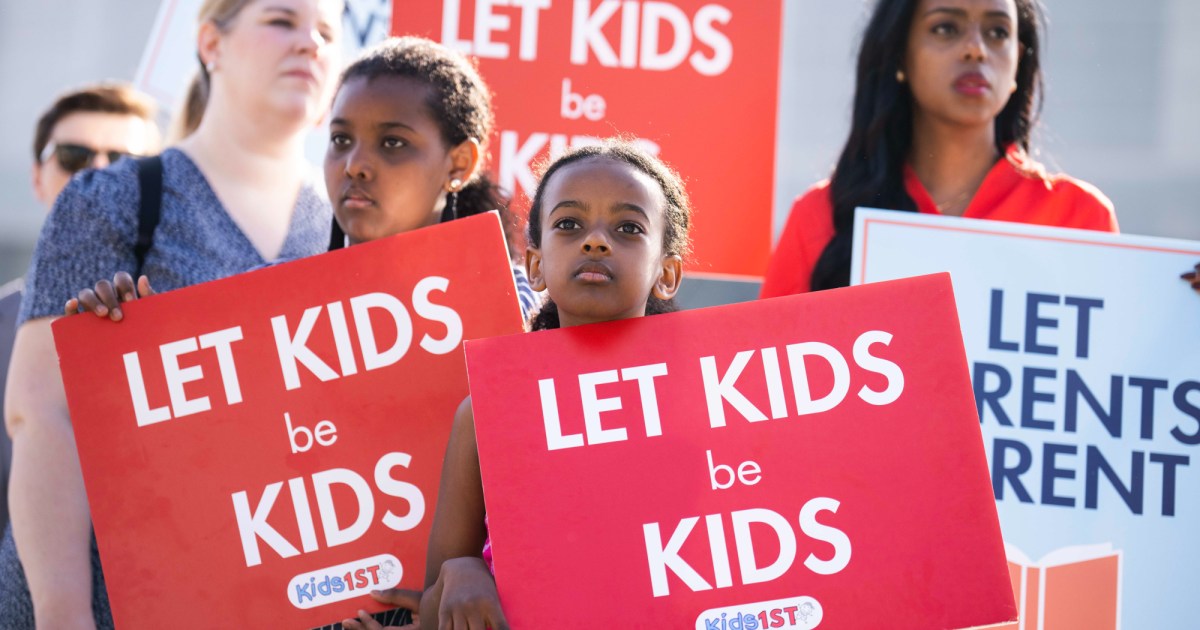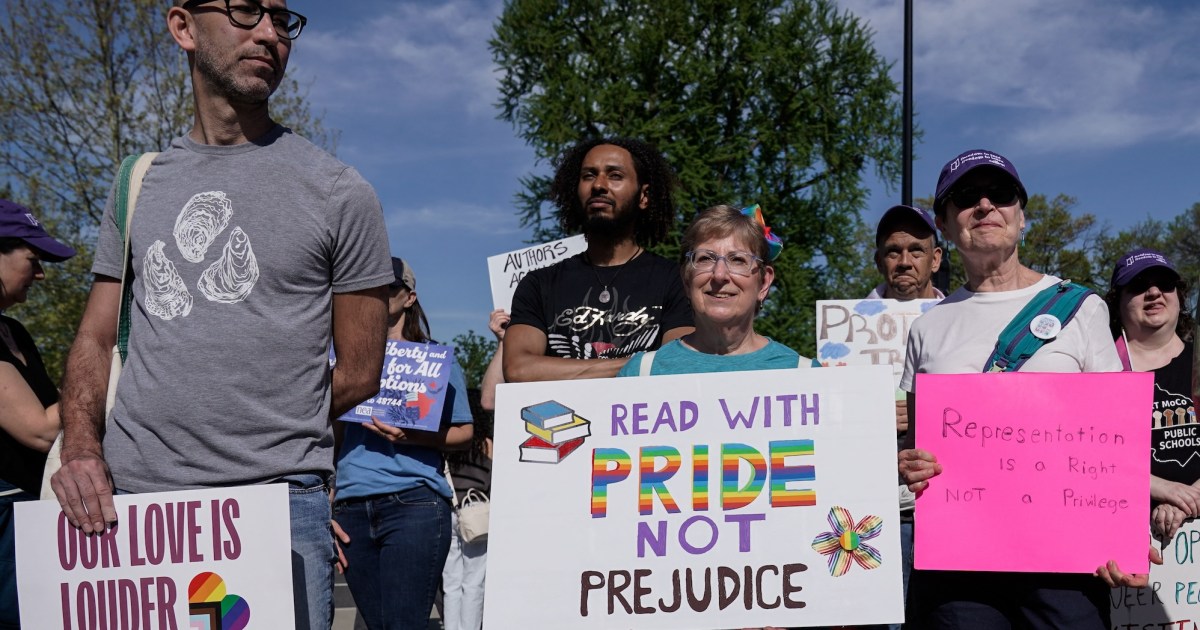Montgomery County, Maryland, is the most religiously diverse county in the United States. When its Board of Education approved a slate of storybooks with queer characters for K-5 English classes beginning in the 2022-23 school year, its main goal was to give kids tools to “work effectively in cross-cultural environments” and “confront and eliminate stereotypes.”
For the first year, the district let parents opt their children out of instruction related to the readings, including on religious grounds. But then it reversed course, announcing that for the next school year, exemptions wouldn’t be allowed. So many families were opting out that the situation became unworkable, the district said. Dozens of students missed class. Teachers and librarians couldn’t keep track of which kids needed alternate assignments.
On Tuesday, the US Supreme Court heard arguments in a case about the constitutionality of that change in policy, with a group of mostly Christian and Muslim parents arguing that exposing their children to LGBTQ-inclusive books amounts to government indoctrination.
The case, Mahmoud v. Taylor, is not just about religious freedom. It puts an expansive framing of parental rights before the nation’s highest court at a time when conservatives are invoking such rights to justify a host of right-wing policies, including forced outing of queer students; campaigns against DEI policies and teachings; and parental consent requirements for contraception, STI testing, and other healthcare.
At Tuesday’s hearing, the themes of religious rights and parents’ rights were often intertwined. “Forcing [parents] to submit their children to such instruction violates their religious beliefs and directly interferes with their ability to direct the religious upbringing of their children,” declared Eric Baxter, senior counsel with the Becket Fund, a religious liberty firm that claims credit for “almost half of all Supreme Court victories for religious freedom over the last decade.”
The disputed books share many similarities with classic fairy tales. “The only difference is that the storybooks include LGBTQ characters and their points of view.”
The books at the center of the case include Prince & Knight, featuring a young prince who falls in love with a knight who helps him protect his kingdom from a dragon, and Uncle Bobby’s Wedding, about a little girl whose favorite uncle is marrying another man. A third book, IntersectionAllies, follows characters from different marginalized groups, including people who are queer, Muslim, and disabled. In court briefs, the parents argue that the books’ themes—including same-sex romance and discussions of trans identity—are intended to “disrupt students’ religious beliefs.”
Baxter pointed out that the school district allows parents to opt their children out of sex education classes, and choir students can opt out of singing religious songs. “In a system where thousands of students are daily opted in and out of class for multiple reasons,” he told the court, “there’s no basis for denying opt-outs [to picture books] for religious reasons.”
But the attorney for the school district, Alan Schoenfeld, disputed the idea that exposing kids to books about LGBTQ characters infringes on their parents’ rights. “Every day in public elementary school classrooms across the country, children are taught ideas that conflict with their family’s religious beliefs,” Schoenfeld told the court, including exposure to books about working mothers or war. The goal of the Montgomery County policy isn’t to indoctrinate kids, he said, but rather “to foster mutual respect in a pluralistic school community….The lesson is that students should treat their peers with respect.”
According to the district, a committee of literacy specialists vetted every LGBTQ-friendly book for appropriateness and educational value and posted the books publicly for parents to review before the school board approved them. The disputed books share many similarities to classic fairy tales such as Cinderella, Rapunzel, and Sleeping Beauty that focus on heterosexual romance, the district argues in court briefs. “The only difference is that the storybooks include LGBTQ characters and their points of view.”
One of the key issues at the hearing was the lack of evidence about how the books were actually used in classrooms and how teachers responded to children’s questions about them. According to the district, teachers were explicitly instructed not to use the books to teach about gender or sexuality, or to encourage students to reject their faith. The school board also left it up to individual teachers to decide when and how to incorporate the books into lessons.
For these reasons, there’s no evidence one way or the other in the court record that children were instructed to reject the religious teachings of their parents. Rather, the parents sued to block the no-opt-out policy before it took effect; the Maryland district court rejected their request, but according to court filings, most of the named plaintiffs have since pulled their children from the district. “The record is seriously underdeveloped,” Schoenfeld told the court.
That lack of evidence troubled Justice Ketanji Brown Jackson, who at one point wondered whether the case was “really the right vehicle to evaluate any of these issues.” But several of her conservative colleagues seemed willing to accept the premise that children’s exposure to the storybooks could violate their parents’ religious expression—and they seemed less willing to entertain the district’s reasoning for no longer permitting opt-outs.
The same reasoning could apply to “the parents of a student who wish to prevent their ninth grader from being exposed to evolution, or their sixth-grader being exposed to any pictures of girls who are not wearing a hijab.”
“The plaintiffs here are not asking the school to change its curriculum, they’re just saying, ‘Look, I want out,’” Justice Samuel Alito said. “Why isn’t that feasible? What’s the big deal about allowing them to opt out?”
The “big deal,” as school boards and administrators warn in an amicus brief, is that a ruling for the parents would likely have repercussions far beyond discussions of gender and sexuality. The same reasoning could apply to parents “who wish to prevent their ninth grader from being exposed to evolution, or their sixth-grader being exposed to any pictures of girls who are not wearing a hijab,” the administrators argued.
Justice Elena Kagan seemed to agree. “Once we say … what you’re asking us to say, it will be opt-outs for everyone,” she told Baxter. “I suspect there are a lot of non-religious parents who [also] weren’t all that thrilled” about having their young children exposed to books about gender and sexuality, she added.
In recent years, the Supreme Court has pushed the boundaries of religious freedom while ripping the teeth out of the First Amendment’s Establishment Clause—the provision prohibiting the government from endorsing particular religious views. Since 2018, the court has upheld the right of Christian business owners to refuse to bake wedding cakes and create wedding websites for same-sex couples; allowed the use of state-funded private school vouchers at religious schools; and sided with a public high school football coach who was fired for hosting on-field team prayers after games.
Under President Donald Trump, the federal government has used parental rights to justify eliminating DEI programs in K-12 schools and launching investigations into policies that protect queer students from being outed to their parents. Arguing briefly in support of the parents, Principal Deputy Solicitor General Sarah Harris told the justices Tuesday that denying parents the right to opt their children out of the LGBTQ storybooks amounted to a denial of a “public benefit”—education—because of the parents’ religious beliefs. “Here, Montgomery County offers a free public education to parents only if their children use books featuring same sex relationships and transgender issues,” Harris said.













